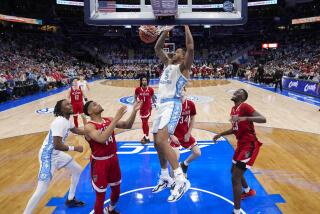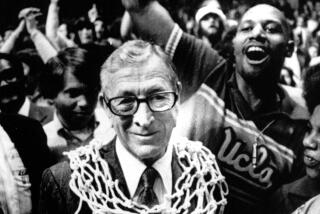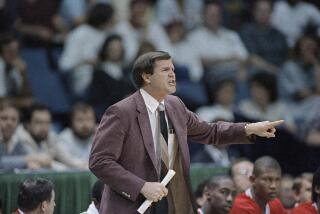The Last Dance
SAN ANTONIO — Kentucky has won, because it has lost.
Lost in the hardest ways, lost the most important things. Lost home games and buried a parent, lost enough star players to stock an NBA team, and lost the coach who revived the program.
And still won, despite the losses. And won, enhanced by them.
Kentucky plays Utah tonight in the national title game at the Alamodome, the Wildcats’ third consecutive visit to the final game, and a chance to win its second championship in three seasons.
Utah, obviously, is the underdog, and should be the underdog. But has any team had a harder run here than Kentucky, lost more significant pieces, undergone such a buoyant transformation?
“We lost all those guys, and everyone thought this was going to be a rebuilding year for us,” senior swingman Allen Edwards said. “So there’s satisfaction in getting here despite that.
“But just getting here isn’t what our goal is. Our goal from the beginning has been to win the national championship. That never changed.”
Forget about the easy rushes of the past two seasons under Rick Pitino, featuring Ron Mercer, Antoine Walker and Derek Anderson and the 1996 national championship.
Focus on the trauma of losing Pitino to the Boston Celtics last spring, and the emotions of a mother’s death on the eve of this season’s tournament.
Utah is big, features Andre Miller, the hottest player in the tournament, and might be the best defensive team the NCAA tournament has seen in years.
But the Wildcats (34-4) have rallied to beat Duke and Stanford in the last two games, and come back from more than that.
“I think what brought the team together most was Allen Edwards’ mother’s illness, and then her death,” said Coach Tubby Smith, who replaced Pitino and immediately touched the Wildcats with his openness and dignity. “The kids saw the pain Allen was going through.
“They saw what it did to his game. They all said, ‘What can we do for Allen?’ ”
Edwards, the team’s tempo-setting senior swingman, slumped this February as his mother, Laura Mae Edwards, battled breast cancer. She died the week before the Southeastern Conference tournament, and she was buried in Holly Hill, S.C., the day before the championship game.
Edwards missed one game to attend the funeral, then started the SEC title game against South Carolina, scoring 15 points with five assists in Kentucky’s 30-point victory.
After starting 21-4 with three losses at Rupp Arena before an uncomfortable home crowd, the SEC title victory was the Wildcats’ seventh in a row, before the five-game tournament run to the brink of a potential seventh national title.
“It’s been mostly a release,” Edwards said of playing in the NCAAs. “After going home to the funeral, I really haven’t had much time to sit alone and think about how life is going to turn out for me.
“I know I had to continue with my life, and the players, the coaching staff and people around me made it a whole lot easier for me not to worry about her as much because she is in a better place right now and looking over me.”
Under Smith, this is a Kentucky team built on balance--emotional and physical, inside and outside, defense and offense.
Guard Jeff Sheppard was spectacular Saturday, leading Kentucky with a career-high 27 points, but he is not a Mercer, capable of scoring 25 every night.
And this is not a team that has NBA-level backups, like the 1996 team, which had four starters from this team--Sheppard, Edwards, Nazr Mohammed and Wayne Turner--as second- or third-stringers.
Kentucky rebounds, it plays a fierce style of half-court defense that Smith calls his “ball-line” philosophy of stopping all penetration, it finds shots for Sheppard, Mohammed and Turner.
Utah stopped Arizona in the West Regional final and North Carolina on Saturday by simply removing those two high-powered teams’ ability to shoot the basketball. But Kentucky is deeper than North Carolina, and has more outside shooters. Kentucky is much bigger than Arizona, and is better defensively.
It doesn’t intimidate like the 1996 team used to, but who does?
“If I had to put my money on it, I’d go with the ’96 team,” Edwards said, when asked which team would win, this year’s or the national-title winners. “They had the marquee players, they were deeper. They were predicted to win the national championship from the start of the season. We weren’t even predicted to make it past the Sweet 16.”
Sheppard, showing wisdom as well as good timing, redshirted last season, seeing that Mercer and Anderson would be dominant players, and that both probably would be in the NBA this season.
Starting forward Scott Padgett sat out the 1996 season after flunking out in his sophomore year, and needed to work three jobs to pay for tuition and find a way to get back on scholarship this season.
Key reserve scorer Cameron Mills was originally a walk-on who played only in blowouts.
Edwards himself was recruited by Pitino to be a point guard, which never developed.
“There’s a lot of little things that have happened through the years that really have led to this team being so good,” Padgett said.
The biggest change was the most refreshing to the program: Smith brought in from two successful years at Georgia (and before that, four seasons at Tulsa and three as an assistant under Pitino at Kentucky), replacing the frenetic, distant Pitino.
“We’ve just been closer this year because we’re closer with our coach,” Padgett said. “We’ve had a lot of get-togethers at coach’s house--birthdays, a boxing match, or the Super Bowl . . . we always get together as a team.
“Coach Pitino has so many people who want him to do so many things, as far as speaking engagements, he was writing his book last year, all those commercials and the radio talk shows.
“And the big thing with Coach Smith is he came in right away and he committed to being available for this team. I think he did it purposely. We had such a short period to get to know each other.”
This is Smith’s fourth trip to the Sweet 16 or beyond in only seven years as a head coach, with three programs.
There were no other candidates for the job, according to Athletic Director C.M. Newton, because there was no reason for them.
“He had such a tough act to follow,” Newton said of Smith. “I mean, these guys all played for Rick. And that is a very difficult, almost impossible thing to follow--to get those youngsters to lose such a charismatic leader and follow him. And he’s done it.”
The hardest times, Newton said, were after the home losses (to Louisville, Florida and Mississippi), when even-keel Smith seemed to be sagging a little from the weight of the Kentucky burden.
“There was a point during this year that I got concerned that Tubby was feeling some of the pressure,” Newton said. “I told him, ‘Don’t you change. Don’t let this job change you.’
“Some of the crazy talk-show stuff and all that starts . . . And I felt that our players, during that stretch, even though we won two or three games during that time, they weren’t having any fun winning. And Tubby wasn’t having any fun. I told him, ‘You better enjoy it while you can.’ ”
More to Read
Go beyond the scoreboard
Get the latest on L.A.'s teams in the daily Sports Report newsletter.
You may occasionally receive promotional content from the Los Angeles Times.










